Having an introverted personality impacts every area of your life. It’s obvious how your introversion influences your career and relationships, but is it possible that there is a link between personality and food? And is there such a thing as an ideal introvert diet?
As an introvert, you might have already noticed that you have unique dietary needs. For example, you might be more sensitive to stimulants, such as caffeine and refined sugar. Perhaps, you’ve also discovered that eating certain foods does crazy things to your already unpredictable energy levels.
Is it possible that your introversion has something to do with these diet sensitivities?
The research on the subject is thin, but I’ve uncovered some important links between personality and diet:
- Many introverts, identify as a highly sensitive person (HSP) — especially those with ‘IN’ Myers-Briggs personality types (INFP, INFJ, INTJ, INTP) . When you are HSP, you experience hypersensitivity to external AND internal stimuli. Caffeine, alcohol, sugar, and various chemicals are all forms of stimuli that can create fatigue, anxiety, and mental fog in HSPs.
- Introverts are deep thinkers, who make decisions based on their internal experience. Many introverts carefully contemplate — and, even obsess — over the foods we choose to eat, making sure to consider how these foods line up with our values. This can lead to a highly specific introvert diet, which takes into account all sorts of factors, such as animal welfare, the environment, longevity, and disease prevention.
- Many introverts also consider themselves to be empaths. This means that we literally feel the energy and emotions of others. This can impact diet in two ways: 1) Empaths are more likely to process emotions in our gut, which causes digestion issues. 2) Many of us feel intense empathy for other living beings, and for this reason are unable to eat animals, or animal products. This leads a lot of empaths to gravitate towards a vegetarian or vegan diet.
Let’s take a closer look at each of the above links between introversion and diet, shall we?
The highly sensitive introvert diet
If you’re a highly sensitive introvert like me, you know how it feels to be hypersensitive to certain foods. Like many HSPs, I am insanely sensitive to caffeine. Half a cup of coffee will have me bouncing off the walls until 3 am, and drowning in mental fog the next day.
Sugar does nearly the same thing. Other food additives and compounds also do nasty things to my energy levels and mental clarity. Like so many other highly sensitive introverts, I feel at my best when my diet is free of:
- caffeine of any kind
- refined sugar
- alcohol
- gluten
- dairy
- processed foods
Now, I should say that I am not labelling any of the above foods as “bad”. These are simply foods, which can create adverse reactions in HSPs. The underlying reasons for our responses to these foods can vary.
Naturopathic Doctor and BodyTalk practitioner Dr. Tonia Winchester explains that there are four main categories of how we react to foods:
Category #1: An allergic response. This is an anaphylactic response moderated by the immune system. It is often triggered by foods like shellfish, and peanuts, and creates a massive histamine release.
Category #2: An IGG response. This is a more delayed immune system response, which can take 12-72 hours to manifest. The symptoms are highly varied, and can include headaches, arthritis pain, and menstrual cramps.
Category #3: Intolerance to foods. This response occurs when we don’t have the proper enzyme to break down a food. For example, when we don’t have the enzyme lactase, we can’t break down the sugar in dairy. Typically, this response causes gut related problems.
Category #4: Sensitivity. This response does not have an immune system or enzyme connection. It occurs when the body doesn’t feel safe with a food because of genetics, or a trauma connection.
I know that this might be a lot of information to absorb. And it doesn’t end there. During our interview, Dr. Winchester blew my mind with some of her revelations about diet and sensitivity. Go here to listen to my entire 20-minute interview with Dr. Winchester.
No matter what category of response you experience, food sensitivities are a pain in the behind. Not only that.
The diet struggle is real for HSP introverts
When you’re an introvert living in an extrovert’s world, having to worry about food sensitivities can compound your struggles. My past client Wayne Boustead, an INFP from Brisbane, Australia, explains:
“Having a sensitive type personality I believe food has a massive impact on my health and how I feel. Eating high sugar and salt foods puts my brain in a foggy state where I can find it hard to concentrate. This puts me in depressive states and I am more susceptible to things like drinking alcohol and eating bad food excessively, which is like a compounding merry-go-round that is difficult to get off. This then affects everything from sleep to how my skin looks and feels and how others perceive me, as well as my weight.”
So, how do we get off this dizzying “merry-go-round” created by our food sensitivities? I’ll be sharing some ideas later, as well as my own highly specific introvert diet. First, let’s talk about another key connection between personality and diet.
- The Highly Sensitive Person (HSP) and Introversion
- Highly Sensitive Introvert: How To Overcome Emotional Overwhelm
- Diet Guidelines For The Highly Sensitive Person
The empath diet
Okay, before we dive into this one, I have to offer a wee disclaimer. I know that the topic of diet and nutrition is sensitive territory. Often, people are as defensive about the foods they eat, as they are about their religion and politics. I get it.
No one wants to feel judged or criticized because of their dietary choices. I want to assure you that there is no judgment here, and I would certainly never want you to feel ashamed about what you eat or don’t eat, lovely!
So, how about everyone just ease their finger off the trigger, and try not to shoot the messenger, or beat yourself up. Because here’s the thing.
Extreme food choices
Nowadays, a lot of introverted empath’s are choosing a type of diet that many consider to be “extreme” or “controversial”. My friend Kristine Einang, who is an INFJ, Soul Coach, writer, and Light worker is a great example of this.
Einang, an empath, has been vegan since April 2016. Her diet choices are deeply influenced by her beliefs and emotions. She explains:
“Ever since 2012 I’ve had trouble with eating meat. Something simply felt off by the thought of eating the flesh of an animal. I know others could feel that shift of consciousness as well that year.”
Einang also acknowledges the impact that food has on her as a highly sensitive empath:
“Being a high level empath and a highly sensitive person, it’s extremely important to me to be conscious of what I eat. I get very easily affected by the food I eat. Sugars and caffeine makes me feel depressed, sick, gives me a headache, and makes my energy levels drop.”

Check out Kristine’s amazing Instagram page
Many empaths feel that by eating beings that were tortured, we are taking on the “energy of the animal’s suffering”. This might sound a little too woo woo for the general public to accept, but it is a common view held by plenty of empaths.
If there is one word to describe the reasoning behind how an introverted empath chooses his or her diet, it is “feel”. They are interested in the emotional implications of food choices.
On the other hand, the name of the game for introspective innies is “think”. Our choices stem from a whole lot of thinking, with a side of more thinking!
The introspective introvert diet
For many deep-thinking introverts, dietary choices are the result of in-depth reflection and careful planning. We think about the moral, physical, and environmental implications of what we put in our mouth.
We also consider the consequences of what we eat more than the average Joe. We know that a Big Mac today could lead to heart disease tomorrow.
Many of us are also keenly interested in diet and nutrition, and relish studying these topics until we go cross-eyed. My friend Michael, a highly sensitive INFP, spent decades fine-tuning his mostly vegetarian (he occasionally eats wild fish) diet, which consists of whole foods that adhere to Michael Pollan’s Food Rules.
He is also adamant about avoiding junk food — “I won’t even label them as ‘food’”, he says — as well as coffee, wheat, alcohol, and most processed food.
Michael attributes his dedication to his introvert diet to his “introverted love of learning about nutritional health.” He adds:
“What drove this diet was deep, long research fed by a desire to live a long active engaged life with top vitality. That was the main motivator for me. It was also driven by the loss of my Dad when I was 12 … he ate all the wrong things, like many in his generation, directly contributing to his fatal heart attack.”
Another one of my past clients, Allen, an INTJ, became a vegetarian as a teenager, after serious reflection about his values system. He explains:
“I became a vegetarian at aged 18 for ethical reasons. I was raised a Christian but at 18 … came to the conclusion that I was what I found out later to be an atheist. I then decided to create my own values system to live by, one of which was to do no harm to any other living creature if I can avoid it.”
The isolation diet
No matter what your reason for choosing a specific diet, having unique introvert diet restrictions can be just that — restricting. It can also feel isolating.
As Dr. Tonia Winchester puts it, “It’s kind of hard to avoid all of those things [that you’re sensitive to] because it can either be socially isolating or nutritionally or diet-wise, boring”
Let’s face it, being an introvert in an extrovert-biased society is already isolating for a lot of reasons. Many of your innate needs, such as your need to think deeply, and spend ample time alone, separate you from the masses, and leave you feeling lonely and misunderstood. Add onto that a bunch of random introvert diet restrictions, and you might as well put a giant “FREAK OF NATURE” sign on your forehead.
The social pressure to eat a Standard American Diet (SAD), leads many introverts to eat foods they know will have negative side-effects. My client Wayne Boustead, who now follows a mostly plant-based diet with some fish, points out that following a specific introvert diet “is socially awkward — I never realized how personal people take food!”
With all the inconvenience and possible isolation of following a specific introvert diet, you might be wondering …
- The Introverted Personality & Loneliness
- How To Explain Your Introverted Personality To Others
- How To Make Friends as an Introvert
Is it worth it?
“Foods can be medicine for us, or foods can be poison,” says Dr. Winchester.
For many introverts, the foods we eat on a regular basis are like slow-acting poisons that have both short-term and long-term effects. In the here and now, what we eat can cause energy spikes and dips that leave us feeling anxious, exhausted, and even depressed. And in the long term?
According to a vast array of studies, repeated immune reactions to food can have serious consequences over time. Not only does eating reactive foods cause tissue inflammation — it is also associated with the following diseases and symptoms:
- Skin disorders, such as eczema, rashes, and psoriasis
- Neurological symptoms, such as depression, migraines, mood swings, and ADHD
- Immune system problems, such as allergies and autoimmune diseases (including arthritis, and diabetes)
- Respiratory diseases, such as asthma, and chronic cough
- Cancer, such as bowel, or breast cancer
I don’t know about you, but in light of the above information, I think the health protective benefits of an optimized introvert diet far outweigh the inconvenience. But the question remains …
- Introvert Burnout: 3 Sneaky Signs You Have it + How to Avoid It
- Are Introverts More Likely To Be Depressed?
What foods should introverts eat?
We’ve already talked about a lot of the foods that can cause an immune reaction in sensitive introverts (dairy, wheat, caffeine). Other common food sensitivities include, peanuts, soy, seafood, and tree nuts. Sensitivities aside, there are other physiological reasons to avoid certain foods.
As you might have noticed, many of the introverts I included in this article have chosen to follow mostly vegetarian or vegan diets. Other than empathy and ethics, there is another reason why I believe these diets appeal to many introverts.
Eating for optimal digestion and energy
Did you know that the digestion process takes a lot of energy?
Animal flesh, especially red meat, is difficult to digest. Most veggies and fruit take less than 45 minutes to digest, and starches and beans take 1-2 hours. Meanwhile, meat, poultry, and fish can take several hours.
This means that for several hours after you take your last bite of Suzy the Cow, your body will be devoting much of your precious innie energy towards breaking down and processing her flesh.
We introverts need all the energy we can get, so consuming more easily digestible, nutrient-dense foods is an easy way to give ourselves a boost.
How to determine your ideal diet
The first step to finding what diet works best for you is to find out what is not working. Most experts recommend eliminating certain foods one at a time to pinpoint specific sensitivities. After you’ve zeroed in on the foods that harm, it’s time to start eating foods that heal.
About the only thing that various diet gurus seem to agree on is this: raw or lightly cooked fruits, and veggies are great for your mental and physical health. Many also recommend a diet rich in legumes, whole grains, and nuts and seeds.
My diet
I am not a nutritionist, or doctor. I’m simply an INFP, highly sensitive, introspective, empath, introvert with a long history of dietary experimentation. After years of trying out different diets and eliminating and adding various foods, here is what my current diet includes and omits.
My current introvert diet includes:
- Raw fruit, especially bananas, berries, mangoes, apples, avocados, tomatoes, limes, and lemons
- Raw greens, especially spinach, lettuce, basil, and parsley
- Raw veggies, especially red pepper, zucchini, and celery
- Cooked veggies, especially kale, string beans, broccoli, brussel sprouts, and cauliflower
- Legumes, especially black beans, white navy beans, and chickpeas
- Starches, especially potatoes, and sweet potatoes
- Grains, especially white rice, quinoa, gluten free pasta, and oatmeal (I also occasionally eat brown or wild rice, but find it hard to digest)
- Tofu, especially garlic smoked tofu — yum! (only a couple times per week as I think I may be sensitive to soy)
- Nuts and seeds, especially raw almonds, cashews, ground flax seeds, chia seeds, natural peanut butter, and tahini
- Organic sauerkraut
- Vegan protein powder, especially french vanilla flavoured Vega One
- Vegan treats, especially organic dark chocolate, and Justin’s organic peanut butter cups (sparingly)
- Condiments, including apple cider vinegar, dijon mustard, Vegenaise, and hot sauce (I try not to overdue it, but I do love my hot sauce!)
- Daiya vegan cheese (sparingly)
- Coconut and olive oil (sparingly)
- Vitamin B12 fortified foods, including almond milk, and nutritional yeast
- I also occasionally take probiotic supplements and digestive enzymes
My current introvert diet omits:
- All dairy, including milk, butter, cheese, and yogurt
- eggs
- All animal flesh, including cow, pig, turkey, chicken, and duck
- All seafood, including fish, and shellfish
- Gluten (I am not as strict with this one)
- Refined sugar
- Caffeine, including coffee, and green tea (it makes me CRAZY!)
- Hard liquor (I do have the occasional glass of wine or prosecco, but I can no longer stomach hard liquor)
As you might have already noticed, my current introvert diet focuses on vegan whole foods. I have eaten this way since November 2016; however, I have been dabbling in veganism and vegetarianism for about two years.
My main reasons for choosing this introvert diet were related to food sensitivities and digestive issues. But as an HSP empath innie, I have been ‘feeling my way’ toward this way of eating for many years.
My current diet has resulted in more consistent blood sugar and energy levels, better digestion, drastically reduced PMS, and clearer skin. I also feel much more mentally sharp (no more midday brain fog), and less moody.
Is my diet right for everyone?
Not necessarily. Many of the foods on my inclusion list are widely known to increase energy, longevity, and overall awesomeness ;P . And many of the foods on my omission list have been strongly linked to heart disease, cancer, diabetes, and a variety of other illnesses (for more info on this, I recommend reading The China Study.)
That said, I do believe that each person has their own individual optimal diet. Discovering yours could be the difference between living a long, healthy, energetic life …
And facing a lifetime of exhaustion, dis-ease, and Grumpy Cat-esque mood swings.
I hope you make the right choices for YOU, dearest!
What about you?
I’d love to hear your thoughts on the best introvert diet? What do you currently include and omit in your diet? Can you relate to what I said about HSPs, empaths, and introspective introverts and diet?
Lots of love,
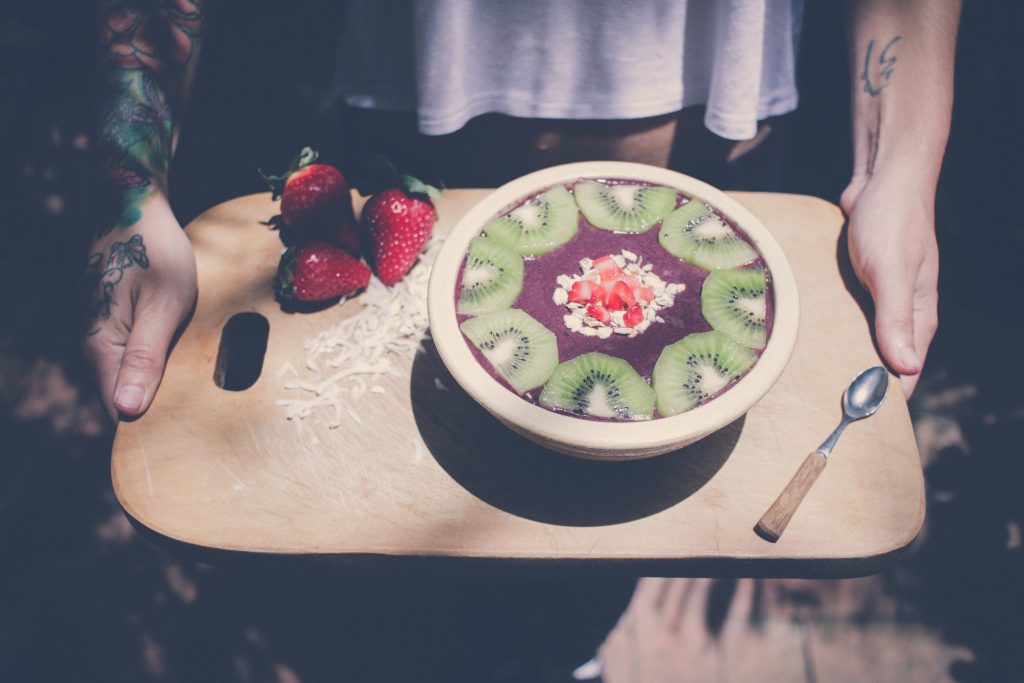


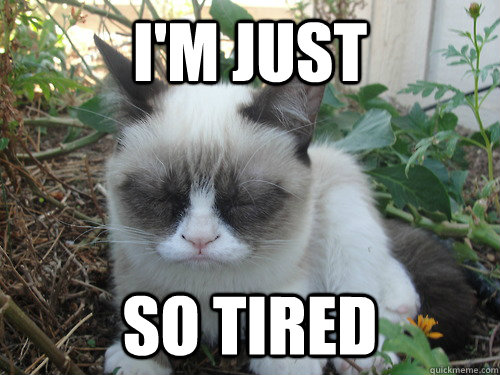

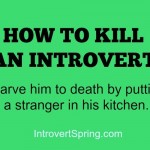
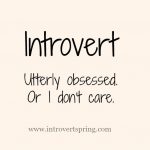
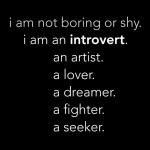








Without saying too much Michaela, marvelous! As someone who is switching to vegan diet, this is priceless insight and advice to me! I’ve noticed months ago that meat, dairy products, coffee’s are having a negative impact on my immune system and organism. Besides health, one of the main reasons for this diet change of mine is the HS INFJ empath nature connected with the concern for animals and the environment. Oh, an wonderful interview too! I love the way how everything is covered, step by step, the symptoms, so I had easy time following the steps on how to read the signs of my body when it comes to the diet I am implementing. 🙂 Beautiful article Michaela!
Thanks for sharing your experience with this, Marko! I’m glad you listened to the interview with Dr. Winchester, too, as she shares a lot of wonderful advice! 😉
I am currently undergoing a very strict elimination diet due to suspected food chemical sensitivities. This goes against most standard nutritional advice, as I’m currently avoiding most fruit and a lot of vegetables, among many other things. Once I’ve got to ‘baseline’ I will challenge each of the different food chemicals individually to pinpoint what is it I’m intolerant to, so I can introduce back the foods I’m ok with. I was diagnosed with coeliac disease 7 years ago so I am already avoiding gluten. I haven’t avoided animal products, and it’s becoming clear the reason for that might be that they are something I can actually tolerate! It just goes to show that everyone has their own individual ‘ideal’ diet, and it can take a lot of work to find out just what that is. I wouldn’t be surprised if there was a link between introversion and food sensitivities!
Thanks so much for sharing your experience with this Rose! Good for you for being persistent in your efforts to pinpoint your sensitivities. It will be worth it!
This is a great blog post, Michaela! And for the record, your quotes of “Michael” (me) are accurate. I feel fairly represented, which is refreshing. 🙂 Being very well-read in nutrition/wellness for decades (yes, my INFP tendency!), I believe you have made accurate statements and reasonable conclusions all around. That’s not easy to do in this subject! 😉 You have tied together a number of subtleties about this issue. Good job!
Great article! As a society, we need to get back to looking at food as not only nutrition, but as medicine. I had to change my diet to borderline vegan/vegetarian several years ago. I noticed very quickly an increase in my energy levels and ability to be around people. However, about 6 months in, it became clear that a vegan diet wasn’t for me. Mostly due to the processed nature of substitution foods. I also found that I was habitually low on protein, iron, and other nutrients that are easier to consume with meat. Now I incorporate poultry, fish, and seafood sparingly. I have to be careful about where the meat comes from. If it doesn’t come from a farm employing humane practices, I just get sick. It’s a balancing act!
I follow a mostly whole foods, plant-based gluten free eating pattern. I’ve done so for several years, though imperfectly. I am also a Registered Dietitian Nutritionist who ” relish[es] studying these topics until [I] go cross-eyed.”
Thank you for writing this thoughtful article.
I have been working on my diet since 2014. Caffeine, in realistic amounts, is not a problem for me.
I avoid eating cane sugar, processed foods (almost anything in a box) and ALL grains. Eating rice makes me crave something sweet.
I eat cheese, yogurt and half and half, but do not drink milk or eat very much ice cream. I eat a lot of seafood , and occasionally beef and chicken. I eat all fruits, vegetables(okay, almost all, lol) , and some nuts. I don’t eat walnuts or almonds .
I just base it on if I get a stuffy nose or stomach ache after I eat something.. btw I am 60 yrs old 5ft3 120 lbs. I just do what works for me.
I became vegetarian 9 years ago, around this time of year. I did so because of ethical reasons, but I told everyone it was health reasons in order to avoid conflict…. shocking, I know. It wasn’t until 2 years ago that I learned about introversion/extroversion and until 6 months ago that I learned I was an HSP and actually more introverted (an INFP) than I ever let people see. What a wonderful explanation for the diet I already adopted for myself! I somehow feel less abnormal for not eating meat after reading this. Perhaps I can even admit to others why I am a vegetarian now. Of course it might mean having a lengthy intellectual discussion in which I am ill-equipped to articulate anything other than what I feel in my soul. Those “debates” usually take a terrible turn… oh well. C’est la vie!
This is an interest I share with you Michaela. I’ve been primarily a vegetarian since my teens. I’m mostly a raw foods addict, I love raw veggies and fruits and at times can’t wait till I get them to the kitchen, I’ll eat them in the field or forest. My brother’s wife is a registered Nurse/nutritionist and recommends omitting all gluten as it tends to age you and causes inflammation not to mention can lead to leaky bowels. She also says No wheat, soy, or corn of any kind since for the last 50 years those industries have been altering the products to produce more and as such have become toxic, same goes for grain fed animals should not be eaten because many can get sick with things such as E-coli. Her suggestion is to look at labels if it has more than 4 ingredients, don’t eat it, especially if you can’t pronounce it. Oats are better than wheat, when consumed after 45 minutes of digestion however do it sparingly as both spike sugar levels, wheat was found to take an 86 blood sugar level to 186 within that time frame and oats rose to 112.
Women in menopause pre or post should omit all wheat as it can also lead to constipation something that women often experience as they age.
If you want something sweet she suggests raw organic honey in place of sugar and also in place of milk use coconut milk over almond milk as it has a lot of added sugar where as coconut milk is naturally sweet.
I do a lot of my shopping in Asian markets as the food there is often naturally grown and looks more natural, spots and all and there are a wide variety of veggies and fruits. My father provides me with tons of veggies each year and a few fruits like water melon and fresh berries.
I did listen to the interview and actually learned something thank you for sharing that.
Another thing here about diets, it not about starving yourself, it’s about eating highly nutritional foods and yes you can eat far more in quantity of good foods and not gain weight and surprisingly you may lose weight as with artificial ingredients of processed foods actually make your brain think your starving and retain fat for survival. It’s not uncommon to see overweight individuals drinking diet drinks or eating low fat foods and still maintaining the weight or gaining more, keep that in mind.
One of the key reasons I made the change was that I was an over weight 12 year old, that was picked on quite a lot during that time, the clothing size of “Husky” killed me, that’s when I decided to get more active and eat right.
I also discovered it depends of your environment, I can drink coffee or tea at work, not at home. I had much more issues with food in the U.K. Than in France. I had to adapt the way I eat in each country, and whenever I go in Germany it is the same. I had also many issues with higly recommended food such as vegetables due to the acidity and the complexity of some of them to digest. I avoid at all costs spicy food, why did they invent that? Overall the article sum up pretty well the hell for hsp to feed ourselves. I entered a routine where I eat always the same thing spread on 2 or 3 weeks. The worst of all, is hearing people saying I need to eat meat every day because it is tasty… I eat meat but try to reasonably decrease my consumption and priviledge chicken over others meat. Food is really a personal choice but people need to be aware of the consequences, how is it made?
That’s crazy, I switched to a mostly vegan diet about two years ago and had no idea it might be connected to my personality type. Makes sense! It’s also very true that it amplifies the isolation feeling, though I am adamant about getting people to see around it. The mantra of “How do you know someone’s vegan? don’t worry they will tell you” is definitely not true of me, I try to go unnoticed with it as much as possible.
Please don’t “go unnoticed” regarding your vegan diet. You should feel proud of yourself for your empathy. Spread that empathy thought process around. The world needs to learn. You are one of many. Be proud!
I agree that introverts have more food issues than most. I am an HSP (INFP) and have always been more sensitive to foods than anyone else I have ever met. My husband is HSP (INTJ) and has terrible intolerances. What we discovered was that I have a nasty double mutation of MTHFR C677T, which means I can’t detoxify much of anything. We also found that my husband has CBS mutations, so he cannot process high sulfur foods. Making our diets work around the mutations has been a lifesaver-literally.
Love this! I am an introvert, an HSP, and a vegan, and I often feel excluded from social groups because of my diet. Friends will want to go out to eat at a restaurant that is not vegan-friendly, people make snide comments about my food and lifestyle, and sometimes I can’t help but feel sad and angry that people I love continue to contribute to animal suffering by eating animal products. It can be very draining to be an HSP and vegan because I am easily hurt by all this. But I know that my choices are right for my physical and emotional health, and that’s what keeps me strong!
Hugs! You are one of many.
This is really interesting! I never made the connection between my introvert nature (INFP) and my relationship to food. I’m sensitive to peanuts, get headaches when I drink coffee, and don’t care at all for alcohol. I went vegan in 2015 when I watched someone explain how, by eating animals (and their secretions) that lived tortured lives and were filled with fear at the moment of slaughter, we are ingesting that low-vibrational fear energy into our own bodies. That, in turn, affects what we manifest into our lives based on the law of attraction. I know, totally “woo woo,” right? But it made sense to me, and I feel fantastic now eating a whole food, plant-based diet!
I’m an INFJ who was never sensitive to foods until I hit age 30 (no more gluten for me!). I eat mostly Paleo now, which makes me feel so great! Grains used to spike my blood sugar and make me so sleepy, but without them I have way more energy. It’s incredible.
I’ve had a much different experience while eating meat. Probably due to growing up on a farm. All of our cattle had names and I would pet them and tell them stories. They had lovely lives. And they did not suffer when butchered (I saw for myself). When we’d eat them, we’d know them by name and also know that nourishing our bodies was their purpose. (Everyone needs a purpose, even animals!) In fact, those cattle would not have been born if it weren’t for our need for them. So I have a great respect for the meat and other animal products I consume. I also wouldn’t be able to get all the nutrients I need without them since I don’t eat grains or legumes (which are not so great for people who, like me, have an autoimmune disease).
And since you referenced The China Study, I thought I should share this: https://deniseminger.com/2010/07/07/the-china-study-fact-or-fallac/
It’s a bit data-heavy for my F side, but definitely an important read.
Keto Diet (Low Carb High Fat). I have been doing this for over 2 months now and have such clarity with my thoughts, am less irritable, and healthier and lost weight.
No carbs so no pasta, rice, potatoes etc. No junk food such as soda, cookies, candy, chips, etc.
Avoiding carbs and sugar is the way to go and eating real natural foods provides you with the energy you need for your brain and for yourself to function properly. All this carb loaded sugar loaded foods just leads to more fatigue, burn outs, and even diabetes.
I recommend doing some research and check out the diet doctor. 🙂 Cheers
But this is what i follow.
I felt so validated as I read this, my family & friends have given me flak for years over my eating choices. I stopped eating beef over 30yrs ago, before I stopped drinking alcohol. Later I learned of my Empath abilities & Myers Briggs Introvert label. I became lactose intolerant 20yrs ago and in the last 5yrs, Gluten sensitive. I eat fish & poultry but keep it organic as well as produce. I love my coffee but limit it to 2 cups in the am, & 1 cup of black tea mid day.(2pm) I avoid most packaged foods, look out for corn syrup & partially hydrogenated oils! But snacks have gotten healthier & varied. I’m always thrilled when I find something that I can eat that fits into my strict guidelines.
Interesting! Reading the comments here I feel like I might be in the minority a little bit – I’m an INFJ and I definitely consider myself a bit of an empath but I pretty much live on coffee, pizza and beer!
I’m also one of those weirdo, night-owl, vampire types so red meat really helps with my anemia and I absolutely adore anything spicy or hot. I can eat a jar of kimchi in one sitting, something that would probably mess up the digestive tract of a lot of people!
I also have an intense dislike of any kind of citrus fruit and flavors like ginger and turmeric, which are super trendy in the health community these days.
I respect people’s dietary choices and I absolutely understand that people need to ingest what feels good and right to them. Since I’m not super picky – aside from the citrus and ginger thing – I’m usually incredibly gracious about accommodating vegan or vegetarian friends.
My partner – who is autistic – is the worst person to cook for, since he can’t stomach (literally) most fruits and veggies. I think it’s sensory thing for him, and I try to be as respectful as I can about it.
I have histamine intolerance, so am sensitive to many foods such so avocsdo, Banana, aged meats, fish etc. I tend to go without meat for several days but I also find my mood drops so badly if I don’t eat some animal protein at least once every three days. It’s just how my body seems to work. I’ve tried vegan protein powders but they make me feel worse. Beans and legumes make me moody (due to the lectins in them, I suspect). Soya is a huge trigger. So personally I’d be concerned about not getting enough nutrients if I went all vegan, as much as I do respect that way of living. My friends are either vegan or into clean eating so I’m glad I at least have a little tribe where food isn’t bad so much of a personal issue haha…no need to worry about people thinking in crazy for not eating sugar or cake!
This article made me cry. I don’t know anyone else IRL that experiments with diet the way I do. Thank you for the validation. I’m really not crazy! Just an HSP introvert.
I have an autoimmune disease and have figured out completely on my own that gluten, dairy, soy, oats, and all legumes are triggers.
Over the years I have tried paleo, vegan, intermittent fasting, and all sorts of variations.
I would love to eat a McDougall style vegan diet but I can’t because of my legume sensitivities. I simply cannot get enough protein and I get really sick so I eat meat.
I have come to a place of acceptance with it. Many animals eat animals. It is part of the circle of life. It’s not unnatural. Plus that I believe that plants are far more intelligent than we give them credit for. I have a wonderful bond with the giant oak tree in my yard. Because of this, eating plants is still eating a living being. Life eats life. That is the order of things.
Anyway, this post was very validating for me. Thank you.
Food for thought! I hadn’t considered this link but I can definitely relate. Diagnosed with ulcerative colitis, I avoid or use sparingly all of the foods we know to trigger inflammation. I tested for intolerance for animal protein – I do eat free run eggs and wild caught fish but make sure I get 7-10 fruit and veg every day. We innies are a self-aware breed. I eat up information that supports my choices. Thanks for this!
Excellent article, thank you!
I have found the most helpful food to be raw milk, from grass-fed, and well-kept, happy cows. Truly, I believe there is energy in food.
I don’t find much out there on this topic (energy in food) — can you point me in the right direction?
Note, raw dairy has built-in enzymes that help to digest, which are killed during pasturization and homegination. You very well might be able to have dairy (and benefit), off the farm; worth a try. Milk fasts were a go-to healing practice 100 years ago.
Thanks!
Interesting! I do believe in the power of enzymes. Sorry can’t think of anything on the topic of energy in food.
Interesting! I’ve never thought about it before. Maybe it’s the reason why I’m so angry, sad, depressed, moody, and get triggered easily because honestly, my diet is sooooo bad. I’m an INFJ and HSP and empath. Taking care of my physical and mental health is the first thing I must do when I start to make enough money.
I am an extreme empath, all magnetic, which means I can feel the death feelings of someone in an ambulance, I can blow up computers, stop watches, and a seer and remote viewer, anything I eat doesn’t really effect any of that. The part of me that does need particiular food is my life as an exorcist shaman and I need high levels of protein. It used to be meat (buffalo and elk in the 80s and 90s) but now after 2012 I am mostly vegitarian. The only thing I cannot take energetically is Crystals. Most empaths soul (astral body) within is fragmented by crystals and it drains their life force. Crystals are also a tracking device for miltiary dreamers. If you have crystal residue on you, they can find your soul in dreams. I am glad i never owned a crystal.
Oh my goodness! The answer to all my complicated food burnout in one article. It made me realise all the split second info processing I do before purchasing/cooking/eating every bite of food. No wonder I experience constant mental overwhelm about what to eat. Thank you.
Hello, I’m glad i found a recent comment. I have tried basically everything for the past 10 years. I did stay vegetarian though for a decade.
I’m interested in trying this as well. It’s basically a vegan diet. I have introduced milk products again for some fats and protein but I guess I will remove those as well as see how I feel.
Gluten definitely makes me dizzy. I don’t have weight to lose by food coma and tiresomeness is so real and I do suffer from chronic depression as well.
I’ll commit myself to this with everything i have. I’m praying this should work.